Activist-turned-CEO calls hallyu a product of cultural imperialism
Sejong Center for the Performing Arts, with three major concert halls, two art galleries and nine art companies under one roof, has long been touted as one of the most prestigious art venues in Seoul. Bagh In-bae, new president of SCPA, wants to turn the center that has been pursuing high-level, professional arts for many years into a venue where the public can freely express their “cultural desire.”
“A new era in the country’s art scene has come. The audiences don’t want to suppress themselves during a one- or two-hour performance anymore. They want to be a part of the shows,” Bagh told The Korea Herald in a recent interview.
“Sejong can become a venue for staging performances like community music competitions in which about 1,000 citizens participate. The center can be a place where citizen can express their cultural desire,” he said.
 |
Bagh In-bae, president of Sejong Center for Performing Arts. (Lee Sang-sub/The Korea Herald) |
Sejong Center will open itself more to citizens by strengthening ties with community art centers. Possibilities include producing new art projects together or staging Sejong’s signature performances at community centers in Seoul. Bagh took 2.1 billion won or 30 percent of annual budget from the nine art troupes in Sejong and re-allocated the money to this new project.
Bagh will also adopt an audition system for selecting new repertoires for Sejong. Currently, art companies in Sejong have been selecting their own repertoires. Under the new auditioning system, not only art companies in Sejong but also art troupes from outside are eligible to audition.
“Creative works have to be new, fresh as always. I’m doing this to create new repertoires, not make copies of successful performances,” the 58-year-old president said.
The innovative but challenging idea comes from Bagh’s 30 years of experience in Minjung art, a political and cultural movement of the 1980s that resisted authoritarianism.
Bagh is the first activist-turned-CEO to head one of major art venues here which have been frequently led by bureaucrats. A Seoul National University graduate who studied physics, Bagh has worked as artistic director of progressive theater company Hyunjang and served as a board director at The Korean People Artist Federation, a group of Minjung artists. He was appointed by Seoul Mayor Park Won-soon, a former activist lawyer, earlier this year. Bagh was part of Park’s mayoral election camp last year.
Asked whether he plans to introduce Sejong’s repertoires abroad to take advantage of the popularity of hallyu, Bagh said he is against the idea.
“Hallyu is a product of cultural imperialism that forces people in other countries to solely accept Korean culture,” Bagh said.
“We have to exchange art works and respect each other’s cultural asset,” he added.
The new president also pointed out a anti-hallyu movement rising in some parts of Asia.
“Korean Wave, a kind of cultural patriotism, has caused some people in Asia to express their dislike of Korean culture. We should also bring their culture to Korea as well. This is what culture is really about,” he said.
By Cho Chung-un (
christory@heraldcorp.com)







![[Weekender] Korea's traditional sauce culture gains global recognition](http://res.heraldm.com/phpwas/restmb_idxmake.php?idx=644&simg=/content/image/2024/11/21/20241121050153_0.jpg)
